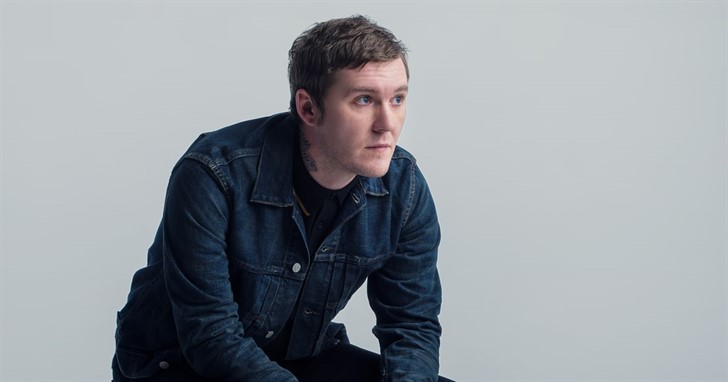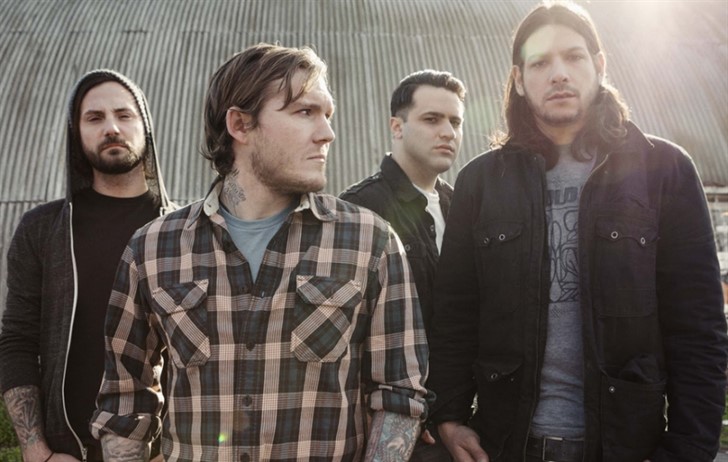Brian Fallon: Greetings From Asbury Park
 Drew Gurian
Drew Gurian
It’s a cold, stark day in Asbury Park, N.J. In the summer months, the streets are typically flushed with tourists, beach dwellers, pleasure seekers and music fans. But it’s a very different scene in the winter. Brian Fallon takes one last quick drag of a cigarette before hopping into his SUV, where he’s going to offer up a private tour of the famed resort town that has made a lasting impact on his career and life. Joel Osteen Radio is on SiriusXM, and he turns it down so there’s nothing to hear but the tires hitting the road. He pulls out and starts to head toward the ocean, but you can’t see any signs of beach life, except an errant seagull, seemingly lost, or trying to remember what it’s like to be warm.
“That’s where Springsteen joined us onstage,” he says, pointing out the Asbury Park Convention Hall, a weathered looking brick building where The Gaslight Anthem played a big show supporting their 2010 album American Slang. He’s met The Boss several times, but, as he so eloquently says, “it’s kinda like Santa Claus and Christmas. It’s always exciting.”
Fallon doesn’t mind reminiscing about the band that put him on the global map or the fact that they’ve been on a break since 2015, a year after their last album Get Hurt was released. That LP and its subsequent tour left him and his bandmates with a realization: The Gaslight Anthem was running out of steam. The group’s hiatus gave him time to regroup mentally and creatively, so much so that he was ready to jumpstart a solo act soon thereafter. Essentially, he hit the pause button on a career that had catapulted him into the spotlight 10 years ago. But the thing with catapults is that you don’t have any control over how high, how fast and how far you go. You’re just there, in the air, flailing.
“We couldn’t complain but, at the same time, we had to keep working in order to keep the whole thing going,” he says. “And we weren’t crying poverty or anything like that, but there were definitely decisions where we were like, ‘Well, we’re tired. I don’t know if we wanna do another tour.’ But you would do it if you felt like you had to. It wasn’t always about income. A lot of the times it was about: ‘If we don’t do this, will we be able to retain our career in the future?’ And we were never sure.”
He slowly pulls away from the Convention Hall—there isn’t a soul on the street and it’s nearly noon. It’d be easy to equate this to some sort of metaphor for Fallon’s career right now, correlating the ghost town he’s driving around with embarking on a solo career. Starting over is always a risky move. Will anyone show up? Or will you be forgotten? It’s an up and down roller coaster of a career coming to a stop after one last thrilling loop.
Soon after Gaslight paused, Fallon started working on Painkillers, his 2016 solo debut. It didn’t stray too far away from The Gaslight Anthem’s sound—his growly voice is a pretty defining feature of their music—but, like any new venture, especially once you’re established and known for something else, it was a completely daunting task. Painkillers was much more of a folk-meets-punk approach with sentimentality and optimism brimming throughout.
“This reset the clock,” he says. “I didn’t have anything to live up to. And people have been gracious about that. And they haven’t said, ‘Well this record doesn’t sound like [The Gaslight Anthem’s breakout] The ‘59 Sound.’”
As he leaves the Convention Hall, Fallon slowly cruises past the Wonder Bar, another classic Asbury Park beach joint. The outside is decorated with the eerie larger-than-life “fun face” painting. A sign boasts the Wonder Bar’s “Wonder Burger” and Fallon cautions to steer clear of that, a little smirk emerging from the corner of his mouth. It’s a trait that you’ll notice pretty soon after meeting him. There’s a twinkle in his eye as he speaks to you, and a smile typically present in his conversations, no matter the topic. He exudes positivity.
After Fallon returned home from touring for Painkillers, he didn’t really know what to do with himself. He has two young kids to keep him busy, but in the beginning of 2017, he decided to see if he could write more songs. And he did: Nearly 40 came out in a few months last spring and he had enough good ones that he felt he could record another solo album.
He retreated to New Orleans for close to five weeks starting at the beginning of last June and made Sleepwalkers, his second album. He admits that many of those songs were tossed away, and ended up settling on 12, with the album clocking in at just over 50 minutes. Instead of the folk influences of Painkillers, he honed in on more R&B rhythms, a Motown influence wrapped in a Jersey rock-and-roll body.
“The main difference is the approach and the instrumentation,” Fallon says. “But, look, if I make an art-rock record, it’s still going to sound like Brian Fallon. I know a couple of chords, and I like to talk about the radio, music and rock-and-roll. I feel a kinship to New Jersey. I love Bruce Springsteen. I’m not weird about repeating myself.”
Fallon admits that his own history is one of the hardest parts about making albums. It’s not so much his past styles of recording or curbing some desire to go in a radically different direction, but his previous albums seem to linger around, ready to pounce on his consciousness and prop up his feelings of self-doubt.
“When you get older, and when you’ve had some level of success, that can be a real thorn in your side, creatively,” he says. “Because the minute you’ve had some success, you’ve got to be equal or better than that. And that is very difficult. Until you realize that you kind of can’t equal that. It’s a big psychological mess that happens. Because you go, ‘Well, I did this one thing; people liked it. How do I do that again?’ And that’s your question.”
He pauses for a brief moment, then continues.
“The answer is that you did something that you liked. You loved it. And then people loved what you loved,” he says.
 Fallon with The Gaslight Anthem, who will reunite later this year
Fallon with The Gaslight Anthem, who will reunite later this year
Asbury Lanes is not quite as close to the beach as Wonder Bar, but it’s still in the heart of things. Fallon reminisces about the early Gaslight days, where they’d play Asbury Lanes and the venue next to it, The Fast Lane, and how it would mesmerize him that a few hundred people would come and see him play. He can remember details vividly, too, like stage placements and sound systems they had to accommodate. Now, along with a lot of Asbury Park, Asbury Lanes is going through a makeover of sorts. The Fast Lane was knocked down in 2013, and the bulk of Asbury Lanes appears like it could be heading toward a similar fate soon.
He makes his way over to the Stone Pony, the town’s most historic venue—still booking bands in the winter, keeping live music alive when the profits may not be as big as they are in the warmer months. Next to the Stone Pony is a massive empty parking lot, where they book big acts in the summer, hosting thousands of fans at a time. All of these venues came to define Fallon’s identity, both as a New Jersey native who grew up close by, and now as a 38-year-old father who knows the Jersey Shore is who he is—and he’s quite OK with that.
Sleepwalkers certainly sounds like it came from Fallon’s world. There are characters here and there going through hard times, with a focus on mortality running throughout. Songs like the acoustic-leaning “See You on the Other Side,” “Proof of Life” and the opening rocker “If Your Prayers Don’t Get to Heaven” seem to hit this head on. But it’s not morbid; maybe it’s affectionate at times, or he’s preparing for the future. But it’s not morbid.
“I’m not thinking about death,” he says. “I’m just realizing that existence is finite. It really hits you at some point—for everyone—that your existence is just part of the bigger picture and, you know, it’s a speck of time, even though it’s everything you know. And that hurts. That’s not comfortable. But that sort of helps me actually, because I’m able to just go, ‘Well, I’m not such a big deal,’ you know?”
He pulls up outside Porta, an Italian restaurant that’s been around forever—a steady stream of lunch customers are piling in. Fallon mentions that he used to come here on Sundays because it was the only day of the week he could get meatballs and spaghetti, served together. It’s a hole-in-the-wall type place, but has an old Jersey vibe about it that’s charming and infectious; weathered, yet confident.
Sleepwalkers feels a bit like that, too. It’s mature, and poignant and finds Fallon stretching songs a bit longer, a quality that surprised him when it was finished. He looks up to bands like Green Day, Nirvana and Pearl Jam, ‘90s icons who made albums built to last. Whether or not he’s achieved that, he’ll never admit. Over the last few years, Fallon has worked overtime to try and train himself to disregard negative feedback of his work, wherever it may lurk.
“There’s something inherent about every creative person that makes them them,” he says. “And you can’t run from that. Sometimes you can be criticized for being the same, being similar to yourself. How many times did The Beatles say, ‘I love you’ in a song? Countless times. Fifty thousand times, but they’re The Beatles. So the point is: I couldn’t worry about it, and I just sort of said, ‘I’m gonna make what makes me happy.’ And then if I put it out there and nobody likes it, at least I was happy.”
In early January, The Gaslight Anthem announced they would be coming out of hiatus this summer for some shows celebrating the 10th anniversary of The ‘59 Sound, playing the LP from start to finish. But Fallon’s year will mostly be spent touring behind his solo material, continuing to find himself now, as opposed to a guy he once was.
“Here’s the thing,” he says. “Would I have a [solo] record coming out if I didn’t have The ‘59 Sound? Probably not. [It] gave me a career. But I try not to say never, and I try not to look over fences.”
This article originally appears in the March 2018 issue of Relix. For more features, interviews, album reviews and more, subscribe here.



















